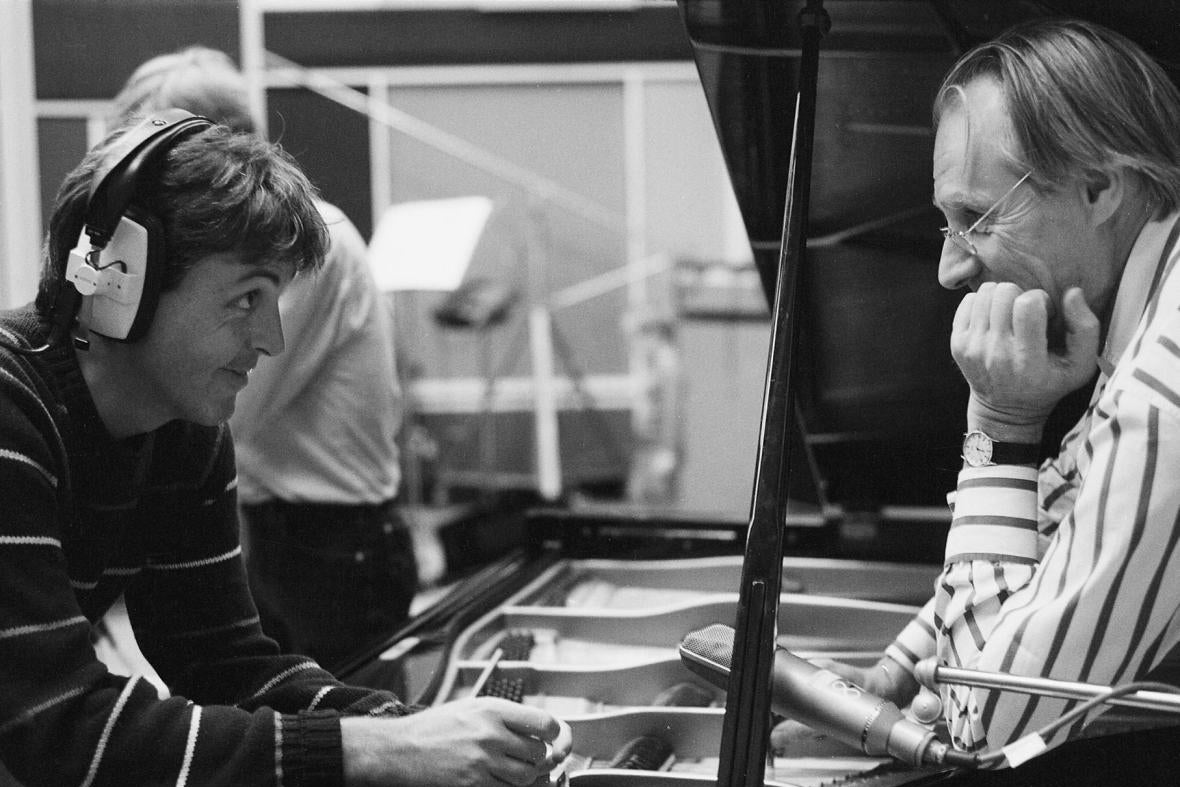Reflecting on the Beatles’ raw, early days in 1962, before they’d started recording hits or even writing many songs of their own, Beatles historian Ian MacDonald wrote of the kind of musical mentor they’d need to meet—someone “highly qualified yet unhampered by the hidebound UK studio scene of 1962.” That the Beatles met such a man, he added, was “a coincidence so unlikely as to be positively mind-boggling.”
That man was George Martin, the meticulous, classically trained, but still frequently open-minded producer of nearly all the Beatles’ recordings. Martin died on Tuesday at age 90, but because he and the Beatles did find each other, he leaves as part of his legacy the greatest discography in pop.
Whether Martin actually was the “fifth Beatle” has always been a silly debate. No one made a greater contribution to the Beatles than the Fab Four—there will never be more than four Beatles—and every group, no matter how alchemical its genius, works with a variety of collaborators who become crucial to their records. But as McCartney wrote today in his remembrance on Facebook, “If anyone earned the title of the fifth Beatle it was George.”
When the Beatles and Martin first recorded together, they were at odds, across classes and generations, the middle-aged Londoner sounding rather posh and uptight to the raucous Liverpudlians. “Their songwriting was crap,” he later said. “The first record we issued was ‘Love Me Do’ and ‘P.S. I Love You’—which are not exactly Cole Porter, are they?” The Beatles were nervous, and Martin launched into a merciless critique of their mistakes, before asking them if there was something they didn’t like about the session. “Well, for a start,” George Harrison said, “I don’t like your tie.” The Beatles’ well-honed comic repartee disarmed him, and soon they had the studio in tears.
The rest is pop music history, and Martin can be heard all over the Beatles’ recordings—sometimes in subtler ways, but sometimes because, well, he himself often played on them. Take that impossible-sounding solo on “In My Life.” Martin played it himself, recording it at half-speed, and then speeding it up, giving it the jaunty-yet-virtuosic sound that makes it bar-for-bar one of the most unforgettable piano solos in pop. Martin often played keys like this with the Beatles—on “Being for the Benefit of Mr. Kite” alone he is credited for contributing piano, harmonium, Lowrey organ, glockenspiel, tape loops, and Hammond organ.
Martin also wrote most of the Beatles’ orchestral arrangements, making him (along with McCartney and the Beach Boys’ Brian Wilson) one of the men most responsible for the Beatles—and pop music’s—late-’60s move towards baroque pop. For “Eleanor Rigby,” he wrote the Bernard Herrmann-inspired score for the string octet. For “Penny Lane,” he annotated the piccolo trumpet solo that McCartney hummed for him, before passing the score to classically trained trumpeter David Mason.
But McCartney is right to, in his own remembrance today, point to one Martin contribution in particular: His arrangement for “Yesterday,” one of the most covered and most acclaimed pop songs of all time.
McCartney writes:
It’s hard to choose favourite memories of my time with George, there are so many but one that comes to mind was the time I brought the song ‘Yesterday’ to a recording session and the guys in the band suggested that I sang it solo and accompany myself on guitar. After I had done this George Martin said to me, “Paul I have an idea of putting a string quartet on the record”. I said, “Oh no George, we are a rock and roll band and I don’t think it’s a good idea”. With the gentle bedside manner of a great producer he said to me, “Let us try it and if it doesn’t work we won’t use it and we’ll go with your solo version”. I agreed to this and went round to his house the next day to work on the arrangement.
He took my chords that I showed him and spread the notes out across the piano, putting the cello in the low octave and the first violin in a high octave and gave me my first lesson in how strings were voiced for a quartet. When we recorded the string quartet at Abbey Road, it was so thrilling to know his idea was so correct that I went round telling people about it for weeks. His idea obviously worked because the song subsequently became one of the most recorded songs ever with versions by Frank Sinatra, Elvis Presley, Ray Charles, Marvin Gaye and thousands more.
Though they came from such different backgrounds and would continue to have artistic differences, Martin and the Beatles would again and again find compromises that still benefit all of us, with McCartney noting “there was never the slightest trace of snobbery about him.” And the Beatles’ production—itself a team effort between the more experimental Beatles and the more classical Martin—has continued to influence everything that followed, as evidenced by the number of producers to speak out in remembrance today. As McCartney summed it up, many years ago, Martin was “quite experimental for who he was, a grown-up.”
